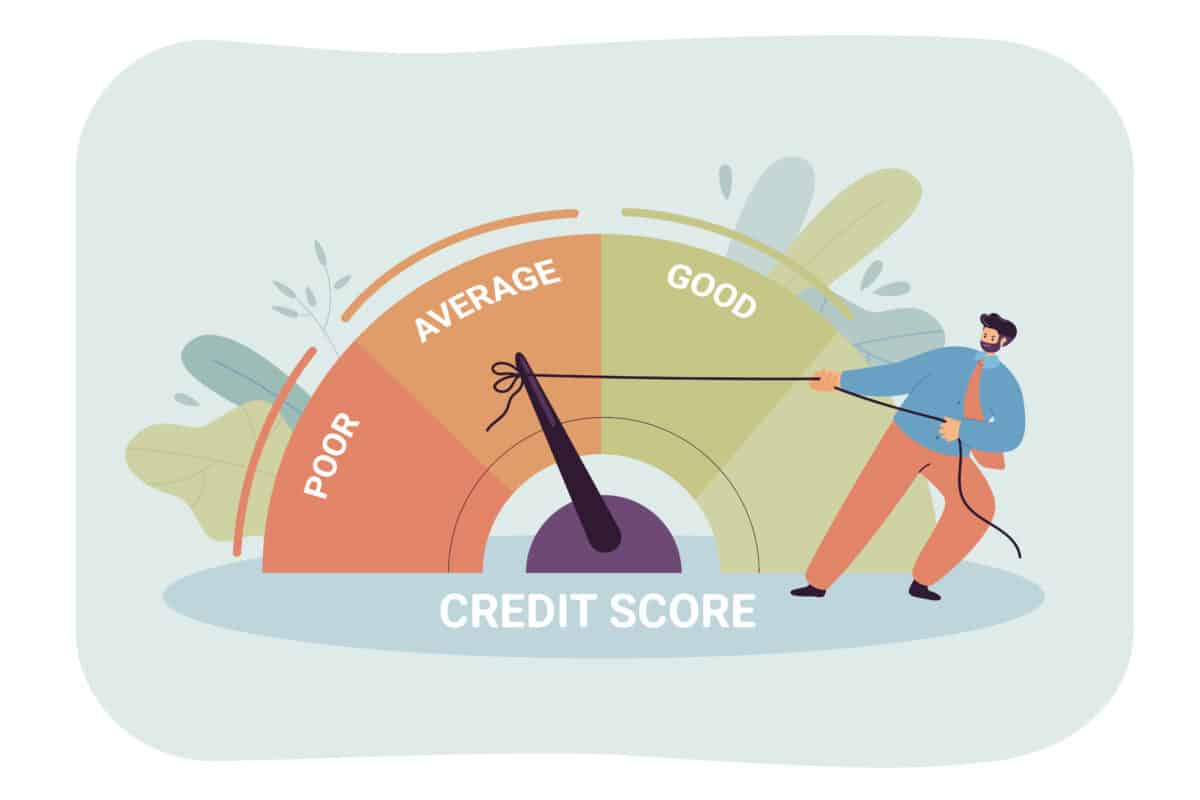How To Build Credit Fast at 18 this Year – 10 Proven Ways that Work
18-year-olds can build credit fast buy establishing good credit habits and taking a few extra measures. We have suggested the best ways to help build credit fast at 18.

Table of Contents
- How To Build Credit Fast At 18?
- #1 Understand The Basics of Credit Scores and Reports
- #2 Become An Authorized User
- #3 Ask For Higher Credit Limits
- #4 Opt For A Secured Credit Card
- #5 Dispute Credit Report Errors
- #6 Handle The Collections Accounts
- #7 Get Credit For Rent And Utility Payments
- #8 Add To Your Credit Mix
- #9 Keep The Credit Card Balance Low And Make Payments Strategically
- #10 Avoid Closing Existing Credit Accounts
- Why Credit Score Is Important
- FAQs
18-year-olds can build credit fast by taking various measures and developing and maintaining good credit habits like making on-time payments on their new credit cards or loans.
At 18, having a good credit score can help you with different financial aspects of your life and future. It can help you access loans and other forms of credit independently and with better terms. You can also buy a car or get car insurance independently and easily. You may sometimes need good credit just to lease/rent some apartments too. Therefore, many teens and their parents are looking to know how to build credit fast at 18.
If you need to build your credit quickly, there are a few measures you can take to help bring it up faster. However, once your credit is up, it’s best to keep track of your credit habits and keep your balances low to maintain a good credit score which is usually above 670. Generally establishing a good score from scratch takes about 6 months; nevertheless, some of the suggested ways can help you increase your score within weeks.
This blog gives 10 practical ways to build credit fast at 18.
How To Build Credit Fast At 18?

#1 Understand The Basics of Credit Scores and Reports
Impact: High
How fast it could work: Varies. Depends on how well you understand the basics and work on the factors affecting credit to improve your score.
Efforts required: Medium. You will need to go through what makes a credit score and what is on a credit report and what influences it.
The first and foremost thing to build a credit score as a young adult is to understand what is a credit report and what makes up the score.
Credit Score
A credit score is a three-digit number between 300 to 880. It helps lenders determine how risky it might be to lend borrowers money. The higher the credit score, the lower the risk associated with lending. This is why people want to raise their credit scores fast as it helps improve their creditworthiness, lowers interest rates offered, and improves their chances of getting various loans approved. A good credit score is around anywhere between 670–739.
FICO credit score is the most common one used by most lenders to check your reliability. This particular model is made up of 5 main factors with varying weightage.
| 5 Factors Affecting FICO Credit Score | Weightage |
| 1. Payment History | 35% |
| 2. Amount Owed | 30% |
| 3. Length of Credit History | 15% |
| 4. New Credit | 10% |
| 5. Credit Mix | 10% |
Payment history and the amount that you owe make up the highest percentage of the FICO score and therefore are the two most important factors to consider when trying to raise your credit score fast early on. The score is calculated based on the information on your credit report.
Credit Report
A credit report contains your personal information like your name, address, and present and past employers. It also lists your credit accounts and contains information about them. Moreover, the report consists of information on your credit inquiries, public records, and collection items. It also shows whether you have been making your payments on time or if there were any late/missed payments.
There are three major bureaus that publish credit reports including Experian, TransUnion, and Equifax If a negative remark is made on your report, it may stay on it for 7 years but the impact lessens with time.
#2 Become An Authorized User
Impact: High
How fast it could work: Fast. As soon as you become an authorized user, your credit is raised instantly.
Efforts required: Low. You will need to ask the account holder(for example a parent) to list you as an authorized user.
If your close friends, parents or, relatives have an existing account with a good credit history then you can ask them to make you an authorized user. If they agree, then the account’s age and as well as its payment history will be added to your credit report. This will instantly raise your credit score too, so you can enjoy all the benefits of having a great credit score.
The friend or relative you ask this favor from does not need to provide you with their card to use or even tell you the account number. They will just need to add your name and details to their existing account to help build credit fast. However, do keep in mind that any financial bumps that your friend or relative experiences in the future will impact you too. Also, make sure that the credit card account in question reports to all three major credit bureaus in the U.S. for the best effect. The three bureaus are Equifax, Experian, and TransUnion.
#3 Ask For Higher Credit Limits
Impact: High
How fast it builds credit: Fast. Your credit score goes up when the request to increase the limit is approved.
Efforts required: Low. You will only need to make a call to your credit card issuer and ask if you are eligible for an increase in the credit limit and they will do it all for you.
This is another effective way of building credit fast at 18. It has a high positive impact on your credit score and you do not need to do much to have it get done. You will need to contact your credit card issuer and check with them if you can get an increase in your credit card limit. If the request is approved, it will instantly lower your credit card utilization. This has a positive effect on credit scores.
However, keep in mind that a request for an increase in the limit is not always approved. The chances of getting a higher limit are more if you have had a pay increase or more years of positive credit experience have been added.
#4 Opt For A Secured Credit Card
Impact: Varies
How fast it builds credit: Slow. Could take several months as you will need to apply for a card, receive it and work on making a positive payment history on it for some time to see the results.
Efforts required: Medium. You need to explore your options and look for a card that reports the credit activity to the major credit bureaus. This all might take a little time to get done and you will need to go through the process of applying for the card too.
Secured credit cards can also help build up your credit over time; however, they are not the fastest way to get it done. Secured credit cards are used like normal credit cards but they have a small credit limit. Since the credit limit on these cards is low, the chances of accumulating debts are too. To get one, you will have to make a security deposit upfront of an amount that is usually the same as your credit limit.
Getting a card will not always increase your credit on its own. In fact, the credit checks that are associated with the application for a secured card may result in a temporary decrease in your overall score too. It is actually a positive payment history on the new card that will improve your credit score in the near future. So basically, when you make on-time payments on your new card, the creditors will report the efficient payment history to the bureaus which will help push up your overall credit scores in a few months.
#5 Dispute Credit Report Errors
Impact: Varies
How fast it builds credit: Varies. It may take around 30 days or more for the credit bureaus to investigate your dispute and respond to it.
Efforts required: High. You will have to request a credit report,which may take some time to arrive. Moreover, going through the reports and understanding them may also be challenging. Filing disputes about errors is a time-consuming process in itself. Plus you will also need to do a lot of follow-ups.
There might be a mistake in your credit card report that may be damaging your credit score. For example, there might have been a missed payment reported mistakenly by your creditor when there was none, or another person’s activity may have been mixed with yours. Sometimes, there might also be information in your report that is old and should not be listed on it anymore. Therefore, auditing your own credit report is crucial to make sure that it is free of such errors.
To do so, you will have to request a credit report from the credit bureau which might take a few days to arrive. Then make sure to thoroughly go through and check for any possible errors present. In case an error is found, you will need to file a dispute with the bureau and they may take up to a month to investigate it and report back to you. The process may be long and tedious, but it is definitely worthwhile and depending on the error, it can do wonders to your credit score.
#6 Handle The Collections Accounts
Impact: Varies
How fast it builds credit: Moderately quickly. The credit score increases as soon as the debt is paid and the status is reported to the bureau.
Efforts required: Medium. Credit reports would need to be requested and read. It may also require some planning.
If the collection agency is reporting the account continuously, it may have a serious negative impact on your credit score. It is best to make sure that you pay off the collections account to avoid getting sued for any type of accumulated debt. You might want to convince the collector to stop reporting your account after the debts have been fully paid. This will help your credit score to a great extent. Moreover, if your collections account is too old to be mentioned in your credit report, or is not accurate, then you can even remove them from your credit reports.
The credit score can build as soon as you have paid your debt and the paid-off status is reported. However, in case of filing a dispute on your collections account or requesting deletion, it may take a few months.
#7 Get Credit For Rent And Utility Payments
Impact: Varies
How fast it builds credit: Relatively quickly if you are able to get the rent reporting instantly.
Efforts required: Low. You will only have to do the initial setup after which it does not take much time or effort.
There are rent reporting services available too that can help in how to build credit fast at 18. These services can add your rent payment history to your credit reports pushing the score higher. However, you will need to have a long record of consistent and timely rent payments to be able to have that positive effect.
Similarly, the timely payments you make on your phone and utility bills can also be added to your reports and can help increase your overall credit scores. To report this data, Experian Boost is one of the best alternate data services that can help you add such payment history to your credit reports. Once the initial setup is done on such services, you may be able to get an increase in your credit score in a matter of minutes even.
#8 Add To Your Credit Mix
Impact: Varies
How fast it builds credit: Fast. The credit goes up as soon as the additions are added to your credit report.
Efforts required: Medium. Time and effort are required to research various service providers available. Applying and getting the service is also a process that you will have to go through and it might take some time to get everything done.
Since the types of loans/credits are a factor considered in the calculation of credit scores, adding to your credit mix can help increase it. If you only have your credit card payments listed under your name, you might want to add other types of credits/loans such as a student loan, a mortgage, or even a credit-builder loan. Getting an additional new credit card may also be helpful as it will not only add to your credit mix but would also reduce your overall credit utilization which will add to your credit score.
#9 Keep The Credit Card Balance Low And Make Payments Strategically
Impact: High
How fast it builds credit: Fast. You may start seeing the results from the next month, especially if your credit score was quite low to begin with.
Efforts required: Low. You will need to set up calendar reminders or account alerts to log in when the balance reaches a certain threshold.
It’s best not to use too much of your credit card balance in a month. The best bet would be to stay under 30% of the available limit. The lower the balance is, the better it would be for the credit score. The people with the highest credit scores are those that use less than 7% of their available credit card limit.
Along with keeping your balance low, it would be wise to pay up any debt as soon as you can. You could try and pay down the amount owed before the billing cycle ends so that when the balance is reported to the bureau, it is low. Another strategy to pay up the balance would be to pay more often, so paying up twice a month could benefit you more than paying it all as a big chunk once. You could set up account alerts that will notify you once the balance reaches a certain level so you can get to it right away.
#10 Avoid Closing Existing Credit Accounts
Impact: Medium to high
How fast it could work: Medium to slow. It is more of a long-term solution.
Efforts required: None
This is more of a long-term solution than a quick way of building credit fast. Before closing any accounts, you might want to check how it is affecting your credit score. This is because closing an account would take away from your credit mix and will also decrease the overall available balance that you can use. This may create a burdening effect on your other accounts and that in turn will reduce your credit score. Moreover, the length of credit history or your account’s age is another factor that determines the credit score. So, if you have had an account for a long time with perfect payment history, it might be better to keep it open.
Why Is The Credit Score Important?
As mentioned before, a good credit score is important as it is a measure of a person’s creditworthiness. There are many reasons to build up your credit score. We have listed a few main ones below.
Easier to get loans
Lenders use your credit score to determine whether they can trust you to lend you the money or not. It can also impact the amount you get as a loan and also the interest rate on it. With student loans, if you have to get a student loan without your parents, you will need a good credit score. The better the score is, the easier it would be to get a loan with a lower interest rate.
Easier to get Insurance
Insurers also take a look at your credit scores and they set the premiums for auto and give coverage based on how good the score is.
Landlords use the scores to rent out properties
Some landlords prefer to rent out their property to those who have a higher credit score. They take it as a measure of credibility and reliability. A good credit score may also lower your payments for mortgages.
Employers check credit scores before hiring
Checking credit scores is a part of the hiring process for some companies and employers. With a low credit score, one might come out as financially irresponsible to employers which may reduce your chances of getting hired.
Buy a car
Buying a car generally requires you to have a good credit score too. A minimum score of 600 is usually required for a traditional auto loan; however, it can vary depending on the lenders. The higher your credit would be, the lesser the interest rate you will get, and your chances of getting a car loan approved will improve too.
FAQs
Can I build my credit score fast at 18 within 30 days?
Yes, it is possible to do so. Just make sure to keep your balance low for the month and pay up on time. The reporting is usually done every 30 days to the bureau. So just taking the simple steps mentioned can help you build your credit fast at 18.
How fast can I increase my credit score?
Those who have a low credit score to begin with, have more opportunities and ways of increasing it significantly. While others, with a good or high credit score, may find it hard to increase it significantly or fast enough. Paying up regularly and more often while keeping your credit balance low can help people push their scores up fast. Other ways to boost your score within weeks are to become an authorized user on another’s card, check and dispute inaccuracies on your credit report, and ask for higher credit limits.
What is a good credit score?
Credit scores range from 300 to 850. A good credit score would be something between 670 to 739. Following are the ranges of the different categories of credit scores.
· Excellent: 800–850
· Very Good: 740–799
· Good: 670–739
· Fair: 580–669
· Poor: 300–579


